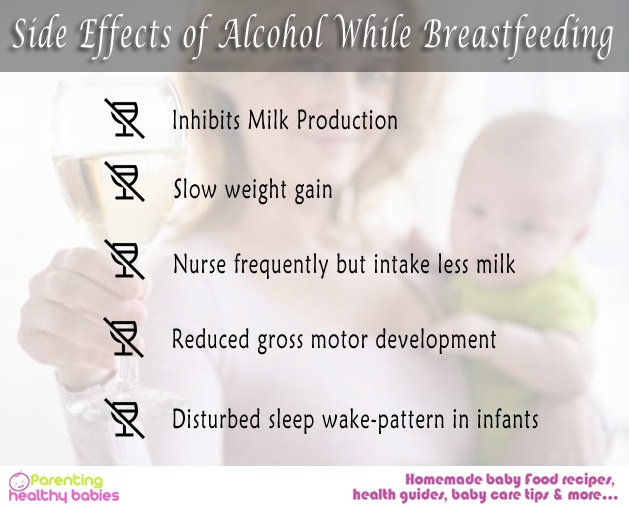Consuming alcohol while breastfeeding may hinder the growth of the baby and may lead to slow metabolism. It may also lead to excessive drowsiness, blockage of milk ejection, disruption of the nervous system, and slow weight gain.
One of the most frequent concerns for mothers who breastfeed their children is related to alcohol consumption during breastfeeding. While the amount that is transferred when you drink a glass of wine is relatively small, your baby is immature and same is his liver, which means he/she cannot process alcohol the same way you do. Babies younger than 3 months take about twice as long as an adult to process alcohol.
Many women have the lifestyle of drinking alcohol frequently. Drinking alcohol during pregnancy is a strict “No”. Breastfeeding mothers will frequently receive advice on whether alcohol is safe for the baby or not. Drinking alcohol while breastfeeding, has many ill effects.
During pregnancy, the recommendation is zero alcohol, not a drop, as it crosses the placenta and can affect the development of the baby. In the most serious cases, it can cause the so-called “fetal alcohol syndrome” responsible for fetal malformations and mental retardation in the baby. It is a harmful substance that enters the bloodstream and passes to the milk that the baby takes, so it is preferable to avoid it.
Side Effects of Alcohol While Breastfeeding Baby
Hinders baby’s growth
Alcohol makes a baby’s sleep. From the moment there are significant doses of alcohol in the mother’s milk, the baby finds it difficult in consuming. He thus breastfeeds less and thus it hinders their growth.
Direct passage of alcohol to baby’s blood
The alcohol consumed passes directly from the mother’s blood to the baby’s blood without being filtered by the placenta and there is no trick to prevent or limit this passage. So it’s the baby who drinks!
Slow metabolism
Baby’s age is also a major factor here as newborns have immature liver, and hence their body does not process alcohol. Also, Infants up to 3 months of age metabolize alcohol at half rate when compared to adults. The more is the alcohol consumed, the longer it takes to metabolize in both the mother and the baby.
Excessive drowsiness
Alcohol may also have short-term consequences for babies like excessive drowsiness and agitation. In large doses, it may be responsible for deficiencies.
Blockage of milk ejection
In addition, alcohol consumption during breastfeeding can also decrease lactation and create a blockage of milk ejection.
Disrupt the nervous system
Alcohol acts as a toxic substance that will disrupt the fetal nervous system and the development of the child. The liver of a fetus does not have the ability to eliminate alcohol as an adult liver.
Disturbed sleep wake-pattern in infants
High dosage of alcohol in breast milk has shown to impact baby’s sleep-wake pattern. Babies whose mom consumed alcohol regularly slept lesser compared to light drinkers. The increased alcohol concentration in breast milk also increases mood swings and aggressiveness in babies.
Slow weight gain
Daily consumption of alcohol by the mother decreases weight gain in the infant. Hence, a mom who drinks frequently has underweight babies.
Reduced gross motor development
Alcohol has a significant impact on an infant’s cognitive ability and gross motor development. Babies whose mother drank alcohol while breastfeeding has shown poor gross motor skills and development. Alcohol also leads to poor memory and concentration ability in infants.
If a mother is consuming excess alcohol, it can be potentially dangerous to the baby as their livers will not be able to metabolize the alcohol. Mothers who are completely intoxicated with alcohol should not breastfeed unless they return to normal state. Pumping out breast milk before drinking can be a good idea to stop alcohol from passing into your milk and baby’s bloodstream.
Breastfeeding should not be avoided as it has its own advantages. Breastfeeding makes it easier for moms to lose weight by drawing on the accumulated fat. If the mother feeds normally, she loses the pounds accumulated during pregnancy.
Read More: 11 Smart Ways to Lose Weight While Breastfeeding
Breastfeeding would reduce the risk of breast cancer, and cancer of the cervix and ovary, reducing the risk of osteoporosis. Giving the breastfeed even over a period of 15 days brings a benefit for the mother and baby because it allows the secretion of oxytocin, a hormone that causes a relaxing effect and makes the mother more relaxed. It is best if the baby is breastfed from birth, after delivery, even if born by cesarean section. This helps to promote the rise of milk, a very favorable situation for the smooth delivery of the childbirth. Some medications are contraindicated during childbirth.













